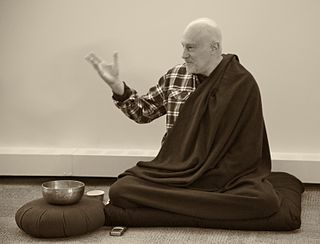A Quote by Sharon Salzberg
By practicing meditation we establish love, compassion, sympathetic joy & equanimity as our home.
Quote Topics
Related Quotes
Gratitude is the state of mind of thankfulness. As it is cultivated, we experience an increase in our "sympathetic joy," our happiness at another's happiness. Just as in the cultivation of compassion, we may feel the pain of others, so we may begin to feel their joy as well. And it doesn't stop there.
To live out of understanding is compassion. Never try to practice it, simply relax deep into meditation. Be in a state of let-go in meditation and suddenly you will be able to smell the fragrance that is coming from your own innermost depth. Then the flower blossoms and compassion spreads. Meditation is the flower and compassion is its fragrance.
Compassion has nothing to do with achievement at all. It is spacious and very generous. When a person develops real compassion, he is uncertain whether he is being generous to others or to himself because compassion is enviromental generosity, without direction, without " for me" and without " for them". It is filled with joy, spontaneously existing joy, constant joy in the sense of trust, in the sense that joy contains tremendous wealth, richness.
Sometimes people feel disappointed when they hear about practicing compassion: "You mean I have to be nice?" It's kind of a letdown. We often overlook compassion, seeing it as merely a pit stop on the way to more advanced practices. We want something more; we don't even know what. But that's just a trick of our mind. One of the greatest teachings is to practice compassion.
Nothing helps us build our perspective more than developing compassion for others. Compassion is a sympathetic feeling. It involves the willingness to put yourself in someone else's shoes, to take the focus off yourself and to imagine what it's like to be in someone else's predicament, and simultaneously, to feel love for that person. It's the recognition that other people's problems, their pain and frustrations, are every bit as real as our own-often far worse. In recognizing this fact and trying to offer some assistance, we open our own hearts and greatly enhance our sense of gratitude.
The meditation that gives you immediate joy or continuous joy is the best meditation for you. Everyone will not have the same meditation. Your meditation will not suit me, my meditation will not suit you. You like a certain food, I don't like it. You are right in your own way I am right in my own way. But once you know what your best meditation is, please stick to it.
Our compassion is the fruit of our spiritual lives; it actually arises spontaneously when formed by intention in our spiritual practice. Love and compassion are always the goods of the spiritual journey, and they are guided by divine wisdom, which then shapes compassion in the concrete situations of our existence.
Spirituality is recognizing and celebrating that we are all inextricably connected to each other by a power greater than all of us, and that our connection to that power and to one another is grounded in love and compassion. Practicing spirituality brings a sense of perspective, meaning and purpose to our lives.


































